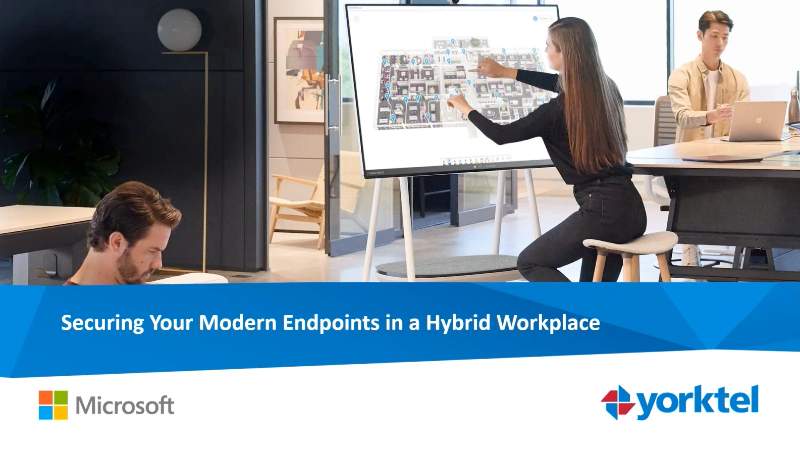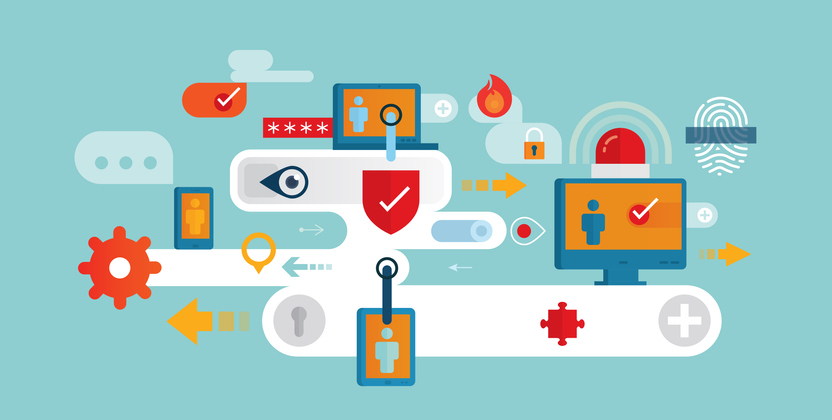With more companies approving remote work and distributed workforces on the rise, a unified approach to IT infrastructure is essential. Legacy systems, remote access, and even shadow IT can create weaknesses in security and organizational governance. In response to these potential threats, forward-thinking companies would be wise to consider a modern endpoint management solution.
What is modern endpoint management?
Modern endpoint management is a unified approach to managing all of the communication and collaboration technology systems involved in keeping the enterprise IT running. The goal is to empower employees no matter their location and to free siloed data while balancing the need for governance and endpoint security.
As enterprise technology and work environments evolve, companies must consider shifting all applications to a modern endpoint management system in order to keep corporate data safe. The modern endpoint management framework provides the opportunity to create a more accessible, safer, and engaging user experience for users.
With so many modern endpoint management software and systems out there, enterprises have various options to choose from to meet their unique needs. Microsoft Endpoint Manager is an example of a well-known industry endpoint management system.
Why is modern endpoint management critical today?
The ideal technology scenario is of a secure, seamlessly integrated system leveraging automated functionality wherever possible and requiring minimal human intervention. But today’s enterprises often have too many systems, applications, and technological interdependencies for a simple approach across dispersed end-users. Untangling the average technology ecosystem and securing all endpoints without interruption to daily business operations requires a unique combination of technical and industry expertise from a partner who can master the challenges of the task.
Unified endpoint management is defined by Gartner as, “a set of offerings comprising mobile device management (MDM) and management of personal computers, via traditional client management tools (CMTs) or modern management, through a single console that also combines the application of data protection, device configuration and usage policies.”
To initiate a transition to a modern endpoint management solution, an enterprise must first bring all mobile, PC, and other devices for each type of employee under one management interface.
Microsoft took this process one step further by introducing a framework that provides granular policies and permissions. It operates over the air, so even remote devices receive critical and timely updates and urgent security patches.
Microsoft Endpoint Manager brings together devices and applications across the enterprise, a necessary operation for enterprises trying to manage legacy applications, remote work, changing data pipelines, and other challenges associated with today’s trend towards a remote workforce operating in hybrid work environments. Instead of treating each piece separately, this approach offers a holistic option for bringing all forms of technology under one single interface.

How can Endpoint Management defend your organization?
Without modern, adaptive Endpoint protection, antivirus software can be easily bypassed, leaving your entire organization vulnerable to attacks. Learn how to prevent this.
What are the benefits of modern endpoint management?
Adopting a modern endpoint management framework offers several benefits that will help enterprises stay competitive and their data secure.
An optimized end-user experience
Users have grown to expect the lightning-fast load times and the personalization that is available in their home network and online retail experiences. Adopting a unified framework brings that same streamlined experience to their work lives as well. When endpoints are functioning at peak capacity with fast load times, up to date software and adequate security, employees can collaborate easily with each other without worrying about their devices.
With all devices updated with the latest versions of business applications, users receive the full flexibility of working from mobile or other smart devices. Users within enterprises enjoy also benefit from quick issue resolution because with modern endpoint management software, IT teams can efficiently diagnose and fix issues. Plus, each employee retains the same access to their apps and tools, regardless of whether they are working from a central office or remotely.
Unified, granular security
Although many enterprises are seeing a return to the office after the events of 2020, remote work arrangements have become the new normal. Enterprises who are adapting to this standard must ensure that offsite devices have the same degree of security as the rest of the network environment. This can be achieved with endpoint privilege management.
Because the endpoint management framework is modular and over-the-air, companies can push critical security updates and exercise governance at a more granular level. A unified architecture also reduces hackers’ ability to exploit weaknesses in the IT infrastructure, as well as resolve operational issues that might lead employees to resort to their own (less secure) workarounds.
Time-savings
The time spent maintaining legacy systems and troubleshooting applications that weren’t specifically designed to integrate can challenge any IT department. With modern endpoint management, IT can automate mundane tasks and reduce hands-on involvement, so teams can focus more on strategic, higher-order tasks.
Employees also enjoy the reduced time spent navigating security issues, updates, and poor connections. Companies can use endpoint device management to support employee productivity by ensuring that all employees have access to the applications they need and that issues are resolved in a timely manner.
Consistency in approach
More than anything, modern endpoint management provides operational consistency. It provides Administrators with the tools they need to make vital security and infrastructure decisions, and empowers IT departments with automation capabilities to create a baseline gains a baseline with automation. Plus, employees experience consistent performance whether they’re using an on-site desktop or their mobile device at a remote location.
Why is modern endpoint management essential for any enterprise?
Modern endpoint management provides a unified approach to business applications and optimizes the employee experience regardless of location. With potentially thousands of devices in any given corporate network environment and an increasing trend towards remote work, enterprises would be wise to prioritize a shift to a modern endpoint management framework.
In addition, with the number of endpoints constantly increasing in the workplace, modern adaptive endpoint protection and management ensures that your organization is adequately protected from today’s security threats.
Yorktel offers Microsoft endpoint management solutions designed to bring all applications and devices under a single interface. A Microsoft endpoint configuration manager makes it simple for enterprise decision-makers to drive company policy forward with security and consistency.
Interested in learning how modern endpoint management can benefit your organization? Contact us to find out how.
